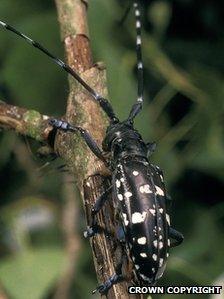Environmental teams tackle outbreak of tree-killing beetle
- Published

The Asian longhorn beetle attacks a wide variety of trees
Environmental teams have begun searching an area in Kent in an attempt to halt Britain's first outbreak of an exotic tree-killing beetle.
Earlier this week, the Forestry Commission confirmed they had spotted the larvae of the Asian longhorn beetle, a threat to many tree species.
It is thought the beetle or larvae was carried in exports from China.
Now people and businesses near Paddock Wood, close to Maidstone, are being warned their trees may need inspecting.
The Food and Environmental Research Agency said its inspectors and the Forestry Commission were surveying the area to see the extent of the outbreak and contacting all those in the area in the coming days and weeks over possible tree inspections.
Martin Ward, head of plant health policy at the agency, said: "In the meantime we would urge members of the public, local businesses and landowners to be on the alert for the beetle and let us know if they find anything."
The beetle is considered a threat to horse chestnuts, birches, beeches, sycamores, maples, willows and poplars.
Not poisonous
It also attacks fruit trees including cherry, apple, plum and pear.
Plants affected by the pests have to be taken down and destroyed by chipping and burning.
In Italy and the US, eradication measures to treat outbreaks have led to the loss of tens of thousands of mature trees.
This latest infestation was discovered about 100 yards from the site of the Hop Farm Music Festival where Bob Dylan is expected to perform in June.
However, the beetles do not harm human beings and, although they can bite, are not poisonous.
The Forestry Commission said there would be no restrictions imposed on human activity.
Dr John Morgan, head of plant health at the commission, said the environmental response would depend on the scale of the outbreak.
"We will need to remove any trees found to be infested and it is possible that we will need to remove potential host trees around the original site as a precautionary measure."
Disease risk
There has been regular monitoring of the area after an adult beetle was discovered there in 2009, but the Forestry Commission says this is the first "outbreak".
The beetles are believed to have arrived in wood packaging from China that was used to import stones to a nearby industrial site.
Adult Asian longhorn beetles, usually found in China and Korea, are shiny and black with white markings - usually between 20 and 40 mm - with striking antennae, sometimes twice the length.
The beetle larvae drill undetected inside the tree, eating the wood and effectively killing the plant or leaving it susceptible to disease.
Infected trees can be identified by circular exit holes usually seen on the main trunk.
- Published28 March 2012
- Published18 April 2011
- Published31 July 2010